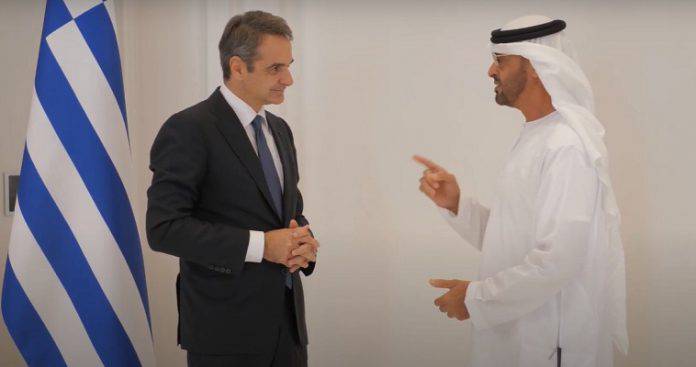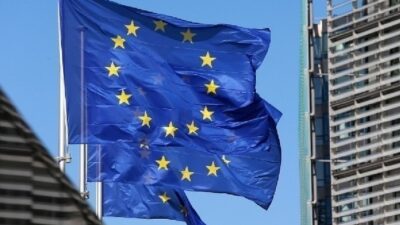Giorgos Lykokapis: Mitsotakis in the Emirates – “Little Sparta” against neo-Ottomanism
18/11/2020
Greece’s alliance with the United Arab Emirates is taking on a strategic nature, as shown by the prime minister’s visit to the Arab country, the second in just a few months. On the sidelines of the meeting that Kyriakos Mitsotakis had with the Crown Prince, two agreements will be signed by the Greek Foreign Minister, the Declaration of Strategic Partnership and the Agreement on Defense and Foreign Policy Cooperation.
At the same time, the government has significant expectations for investments from the Emirates. The Prime Minister is accompanied by the Minister of Development and Investment Adonis Georgiadis, the Deputy Minister of Foreign Affairs and Minister of Economic Diplomacy Costas Frangogiannis and the Head of the Finance Office of the Prime Minister Alexis Patelis, who will meet with executives of Mubadala Investment Company PJSC.
Abu Dhabi is the main investor in Greece from the Gulf region, with the main areas of interest for close economic cooperation including energy, tourism, agriculture, etc. However, given Abu Dhabi’s position in the Arab world, Athens expects mainly geopolitical gains from its alliance with the United Arab Emirates. Greece has always had warm relations and many expectations from the Arab world, if we remember the prime ministership of Andreas Papandreou.
But the Gulf monarchies seemed to be “out of frame” of Greek foreign policy for many years. This is now changing, as shown by the strategic alliance of Greece and the Emirates, but also the close relations between Greece and Saudi Arabia, with the decision of the Greek government months ago to send a Patriot SAM battery from the “arsenal” of the Greek armed forces to the Sunni kingdom.
Condemnation of the Turkish provocations
Greece and Abu Dhabi have a common enemy: Erdogan’s neo-Ottoman ambitions, which have angered the major Arab states. They see the Turkish president’s alliance with political Islam and Iran as a threat to destabilize their regimes and the Middle East. In fact, the Emirates are the ones who oppose Erdogan’s neo-Ottoman agenda, perhaps even more so than General Sisi’s Egypt.
It is characteristic that during the meeting of the Prime Minister with the Crown Prince Mohammed bin Zayed al Nayan, the issue of Turkish provocation in the Mediterranean and not of Iran was raised, something that facilitates Athens that seeks balanced relations with Tehran. In a joint statement, the two leaders condemned “Turkey ‘s violations of the sovereign rights of Greece and Cyprus”, but also its “overall aggression in the Middle East, the Southeast Mediterranean, and the South Caucasus”.
In addition, they expressed their concerns “about the export of terrorism and extremism”, a statement-message to Turkey, even if they avoided naming it this time. Earlier in the month, the UAE foreign minister did so in an interview with “Vima tis Kyriakis” newspaper, where he referred to “Turkey’s alliance with jihadist and extremist Islam” and the “extremist vision of Erdogan and the Muslim Brotherhood for the Arab world.”
The remarks came amid Erdogan’s attempt to stage a “crusade” of the Islamic world against France over Charlie Hedbo’s controversial sketches, calling for a boycott of French products, which appears to have had little effect. We should note that Abu Dhabi had strongly condemned the conversion of Hagia Sophia into a mosque, the Turkish army raids in northern Iraq and, of course, the illegal Ankara-Tripoli memorandum, which should be a priority for Greek foreign policy.
A front against Turkey
All indications are that the Abu Dhabi air force was behind the “orphan” attacks on the (essentially) Turkish base in Al Watiya in Libya last July, which forced Erdogan and his puppets in Tripoli to cancel their plans to occupy Sirte, a city of strategic importance due to its rich oil wells. In fact, it was the United Arab Emirates that first “broke” the isolation of Syria in the Arab world, opening its embassy in Damascus in early 2019.
With this move the Emirates acknowledged their mistake in supporting the overthrow of Assad during the Syrian civil war, showing that their main priority is no longer to curb the influence of Iran and Hezbollah in the Assad regime, but Turkey’s expansionist plans. The UAE were the mastermind behind the co-operation agreement reached between Assad and Libyan General Khalifa Haftar, whose forces it supported throughout the siege of the pro-Turkish regime in Tripoli.
According to Turkish media, it was Abu Dhabi that pressured Egyptian President Sisi to abandon his initially ambiguous stance and warn directly of military action in the event of the occupation of Sirte by Erdogan’s puppetsregerring to the substantial financial support of the Sisi regime through the UAE’s petro-dollars.
For the first time in modern Arab history, a Sunni monarchy seeks an “axis” of secular Arab regimes and leaders, which in fact will not turn against Israel or Iran, but against neo-Ottoman Turkey. It is characteristic that Abu Dhabi has in the past made derogatory reports against the history of the Ottoman Empire, which had angered Ankara, which had replied that the UAE “have been corrupted by oil”!
A tripartite relationship with India
The Emirates are a staunch supporter of Saudi Arabia’s trade war with Turkey, with President Erdogan “keeping mum” and not daring to clash with the leading force of Sunni Islam. It was the Emirates that paved the way for the historic diplomatic “coup” in the Middle East, recognizing the state of Israel, followed by Bahrain and Sudan, and then followed by other Arab countries.
In fact, the Emirates not only support the tripartite cooperation schemes of Greece-Cyprus-Israel and Greece-Cyprus-Egypt (which have provoked anger in Ankara), but seem to accept the proposal of the Greek diplomacy for a tripartite cooperation between Greece, the Emirates, and India, a country of great geostrategic importance, as Turkey is a staunch ally of Pakistan, the historical enemy of the Indian state.
The Emirates, called the “little Sparta” of the Arab world because of their well-organized air force, are, of course, along with Macron’s France, a valuable ally of Greece, more credible than most EU leaders who at best, in some cases, just sit by watching the Turkish provocation to the detriment of two countries of the Union or, at worst, openly advocate for Erdogan’s neo-Ottoman plans.





